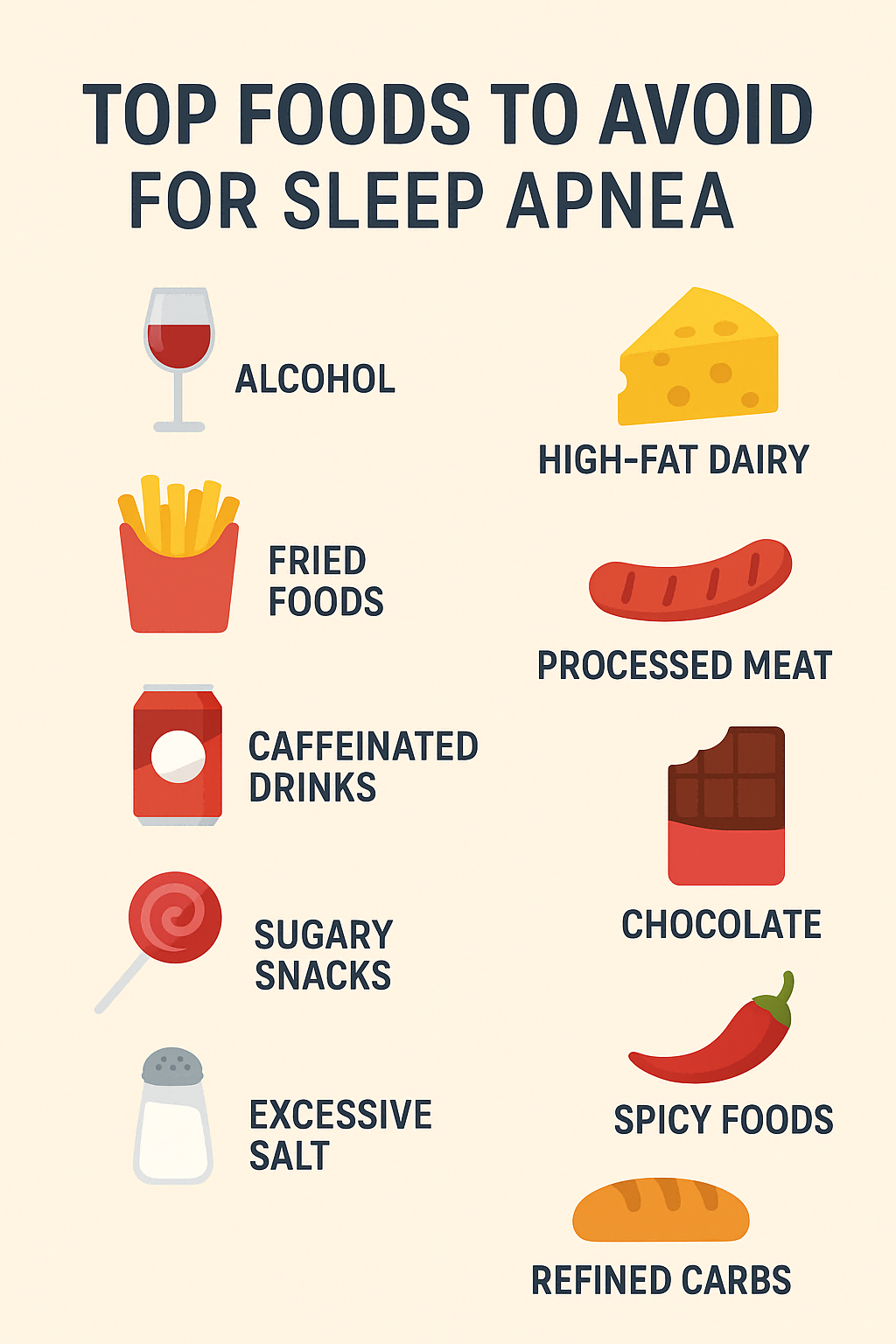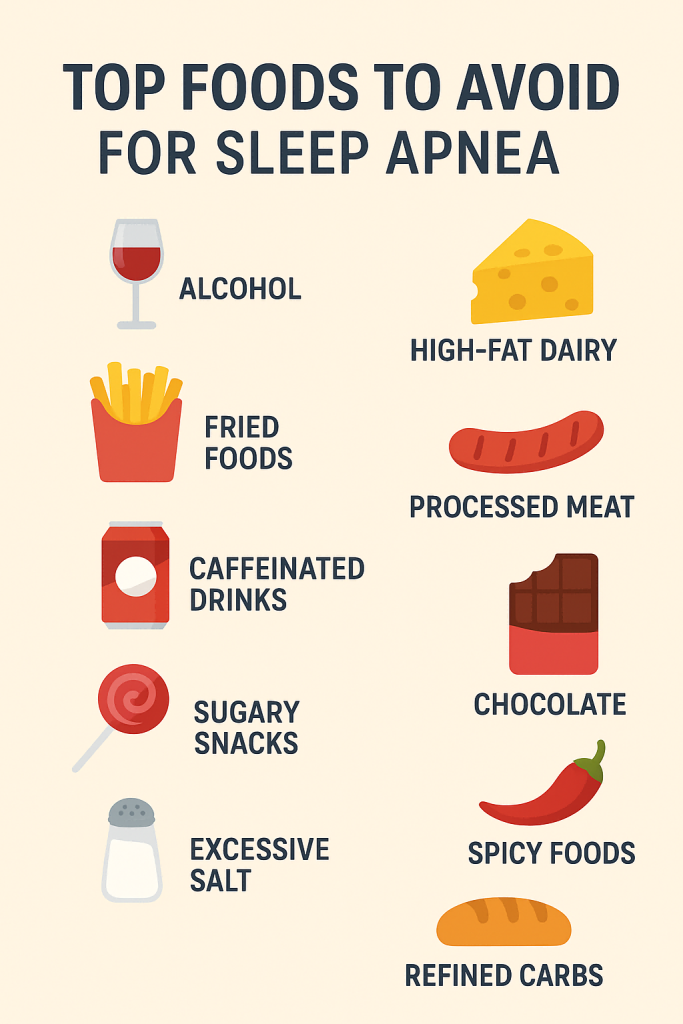10 Harmful Foods to Avoid when You Have Sleep Apnea


Introduction: Understanding Sleep Apnea and Diet
Sleep apnea is a sleep disorder that causes repeated interruptions in breathing throughout the night. It’s not just about snoring—it can lead to daytime fatigue, high blood pressure, and even heart complications. While medical treatments like CPAP machines and lifestyle changes play a major role in managing sleep apnea, your diet also has a surprising impact.
Certain foods can worsen inflammation, relax throat muscles, and even cause weight gain—three factors that directly contribute to the severity of sleep apnea. By identifying and avoiding these foods, you can take an important step toward better sleep and improved overall health.
The Link Between Food Choices and Sleep Apnea Symptoms
Food affects your body in more ways than just providing energy. For people with sleep apnea, poor dietary choices can:
- Increase inflammation in the airways, making breathing harder.
- Promote weight gain, which adds pressure around the neck and chest.
- Interfere with the nervous system, leading to disrupted sleep cycles.
- Trigger acid reflux, which worsens nighttime breathing problems.
This makes it essential to understand which foods aggravate sleep apnea symptoms—and what healthier alternatives you can choose.
Top Foods to Avoid when You Have Sleep Apnea
1. Alcohol and Sleep Apnea Worsening Effects
Alcohol is one of the biggest culprits for sleep apnea sufferers. It relaxes throat muscles, increasing the likelihood of airway collapse during sleep. A glass of wine or beer may seem harmless, but even small amounts can lead to more frequent breathing interruptions.
👉 Tip: If you enjoy social drinking, limit alcohol consumption and avoid it at least 3–4 hours before bedtime.
2. High-Fat Dairy Products and Breathing Disruptions
Whole milk, heavy cream, cheese, and ice cream may taste delicious, but their high fat content can promote mucus buildup in the throat. This excess mucus makes it harder for air to pass freely while sleeping.
👉 Alternative: Switch to low-fat or plant-based dairy options like almond milk or oat yogurt.
3. Fried and Greasy Foods That Trigger Inflammation
French fries, fried chicken, and fast-food burgers are loaded with unhealthy fats. These fats contribute to weight gain and inflammation, both of which worsen sleep apnea symptoms.
👉 Alternative: Opt for baked or grilled versions of your favorite meals.
4. Refined Carbohydrates and Weight Gain Risks
White bread, pastries, and sugary cereals are quickly digested, leading to blood sugar spikes. This contributes to weight gain, especially around the neck, which can worsen sleep apnea.
👉 Alternative: Choose whole grains like oats, quinoa, and brown rice.
5. Red and Processed Meats That Narrow Airways
Bacon, sausages, and hot dogs are high in saturated fats and sodium. These ingredients not only promote weight gain but also increase the risk of acid reflux, a common sleep apnea trigger.
👉 Alternative: Try lean proteins like fish, chicken, or plant-based proteins.
6. Caffeinated Drinks and Sleep Cycle Disturbances
Coffee, energy drinks, and soda can interfere with your sleep cycle. While caffeine keeps you awake, it also prevents deep restorative sleep, making sleep apnea symptoms worse.
👉 Tip: Cut off caffeine at least 6–8 hours before bed.
7. Sugary Snacks and Blood Sugar Fluctuations
Cookies, candy, and sodas may give you a quick boost of energy, but the sugar crash that follows can disrupt sleep quality.
👉 Alternative: Satisfy sweet cravings with fruits like berries or apples.
8. Spicy Foods That Cause Acid Reflux
Spicy dishes may taste satisfying, but they can trigger acid reflux. Nighttime acid reflux worsens airway obstruction in sleep apnea patients.
👉 Alternative: Enjoy herbs and mild spices instead of chili peppers or hot sauces.
9. Excessive Salt and Fluid Retention
Salty snacks, canned soups, and processed meals cause water retention, which increases swelling in the throat. This can make breathing harder at night.
👉 Alternative: Use herbs, garlic, and lemon juice for flavor instead of salt.
10. Chocolate and Its Hidden Caffeine Content
Chocolate, especially dark chocolate, contains caffeine and sugar. Eating it close to bedtime may keep you awake and worsen sleep apnea episodes.
👉 Alternative: Choose a small piece of fruit or herbal tea as a nighttime treat.
Foods and Drinks That May Help Ease Sleep Apnea Symptoms
While avoiding harmful foods is essential, adding certain healthy options to your diet can also make a big difference. Some foods reduce inflammation, promote weight management, and support better sleep quality.
✅ Best Foods for Sleep Apnea Relief:
- Fruits & Vegetables: Rich in antioxidants and fiber, they reduce inflammation and aid weight loss.
- Lean Proteins: Skinless chicken, fish, and legumes provide protein without excess fat.
- Whole Grains: Oats, quinoa, and barley keep blood sugar stable overnight.
- Herbal Teas: Chamomile or valerian tea promotes relaxation before bed.
- Omega-3 Rich Foods: Salmon, chia seeds, and walnuts support heart health and may improve sleep quality.
👉 Pro tip: Balance your meals with colorful vegetables and avoid late-night snacking for better sleep apnea management.
Lifestyle Adjustments to Improve Sleep Apnea Beyond Diet
Managing sleep apnea requires more than just dietary changes. Lifestyle choices play a major role in reducing symptoms:
- Maintain a Healthy Weight – Shedding even 5–10% of body weight can significantly reduce airway obstruction.
- Sleep Positioning – Sleeping on your back worsens apnea; side-sleeping is recommended.
- Quit Smoking – Smoking increases inflammation and swelling in the airway.
- Stay Active – Regular exercise improves lung capacity and overall sleep quality.
- Follow CPAP Treatment – If prescribed, consistent use of a CPAP machine improves oxygen flow and prevents complications.
Sample One-Day Sleep Apnea-Friendly Meal Plan
Here’s a simple plan designed to avoid problem foods while supporting better sleep:
| Meal | Foods Included | Why It Helps |
|---|---|---|
| Breakfast | Oatmeal topped with blueberries and chia seeds | Provides fiber & omega-3s, stabilizes energy |
| Snack | Apple slices with almond butter | Satisfying without added sugar |
| Lunch | Grilled salmon with quinoa and steamed broccoli | Lean protein + anti-inflammatory nutrients |
| Snack | Carrot sticks with hummus | Keeps you full without fried or processed food |
| Dinner | Baked chicken breast with roasted sweet potatoes and spinach salad | Low in fat, supports restful sleep |
| Evening Drink | Warm chamomile tea | Promotes relaxation and reduces insomnia |
Frequently Asked Questions (FAQs)
1. Can cutting out alcohol really improve sleep apnea?
Yes. Alcohol relaxes throat muscles, which increases the chances of airway collapse during sleep. Reducing or eliminating alcohol can lessen apnea episodes.
2. Is caffeine completely off-limits for sleep apnea patients?
Not entirely, but it should be avoided in the evening. Caffeine lingers in the body for hours and disrupts deep sleep stages, worsening sleep apnea.
3. Can weight loss alone cure sleep apnea?
For some individuals, losing weight significantly reduces or even eliminates symptoms. However, medical treatments like CPAP may still be necessary.
4. Are there any bedtime snacks safe for people with sleep apnea?
Yes! Small servings of fruits, nuts, or whole-grain crackers with hummus are light and won’t disrupt sleep.
5. Does dairy always worsen sleep apnea?
High-fat dairy can promote mucus buildup, but low-fat or plant-based alternatives are usually better tolerated.
6. What role does salt play in sleep apnea?
Too much salt leads to water retention and throat swelling, which narrows airways. Cutting back on sodium is highly recommended.
Conclusion: Making Smart Food Choices for Better Sleep
Sleep apnea can disrupt your life, but dietary choices give you powerful control over your symptoms. By avoiding alcohol, fried foods, refined carbs, processed meats, and other harmful options, you reduce inflammation and breathing difficulties at night. Replacing them with fruits, vegetables, lean proteins, and whole grains helps you breathe easier and rest better.
The key is balance. Small, consistent changes in your diet—paired with healthy lifestyle habits—can improve sleep quality and overall well-being. Remember, better food choices today mean more restful nights tomorrow.
👉 For more in-depth guidance, the American Sleep Apnea Association offers helpful resources on nutrition and sleep health: www.sleepapnea.org.
















